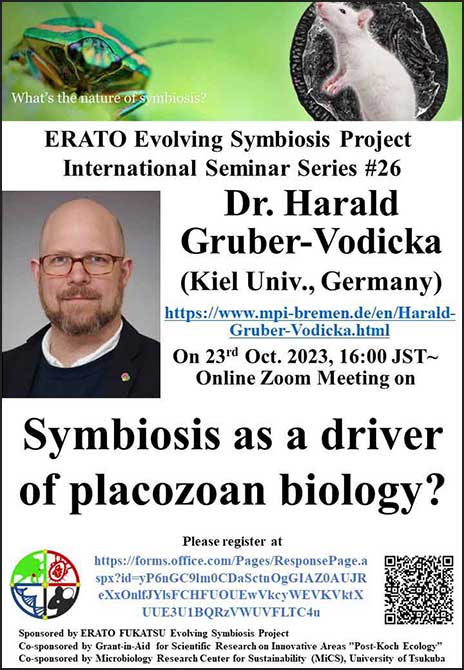第26回共生進化機構国際セミナーをオンライン開催しました。
平板動物その他海産無脊椎動物の内部共生微生物の研究で知られるDr. Harald Gruber-Vodicka (Kiel University, Germany)にご講演いただきました。

Abstract: Placozoa are an enigmatic phylum of simple and microscopic marine metazoans and exciting models for metazoan development and evolution. Several studies noted the association of placozoans with bacterial symbionts. While two intracellular symbionts from Rickettsiales (Alphaproteobacteria) and Marinamargulisbacteria have been characterized, the phylogenetic composition of the larger placozoan microbiomes, their evolution, and their interactions with the hosts remain unknown. Based on our microbiome data from phylogenetically diverse placozoans sampled from globally distributed sites, placozoans are associated with variable microbiomes, but all harbor a Rickettsiales partner. In addition to these rickettsial partners and the Marinamargulisbacteria that are present across the placozoan diversity, several more intracellular symbionts but also several ectosymbiotic groups are common and form the core microbiome of placozoans. Multiple bacterial groups associated with placozoa feature secretion systems that enable them to tinker with their hosts cell biology and likely also have an organism scale impact. Recent data from animals cured from the rickettsial intracellular symbionts suggests that a switch from the grazing and asexually diving lifestyle to a dispersal stage only occurs in infected animals. In addition, the placozoans also depend on their rickettsial partners to supply digestive enzymes that are crucial to exploit common algal food sources. I will therefore discuss the role of the associated microbiota when exploring key aspects of placozoan biology such as dispersal, sexual reproduction, stress response, or nutrition.
ERATO Evolving Symbiosis Project International Seminar Series #26
第26回共生進化機構国際セミナー
Sponsored by ERATO FUKATSU Evolving Symbiosis Project
主催:ERATO深津共生進化機構プロジェクト
https://www.jst.go.jp/erato/fukatsu/
Co-sponsored by Grant-in-Aid for Scientific Research on Innovative Areas "Post-Koch Ecology”
共催:新学術領域研究「ポストコッホ生態」
https://postkoch.jp/about/
Co-sponsored by Microbiology Research Center for Sustainability (MiCS), University of Tsukuba
共催:筑波大学微生物サステイナビリティ研究センター(MiCS)
https://www.mics.tsukuba.ac.jp/


